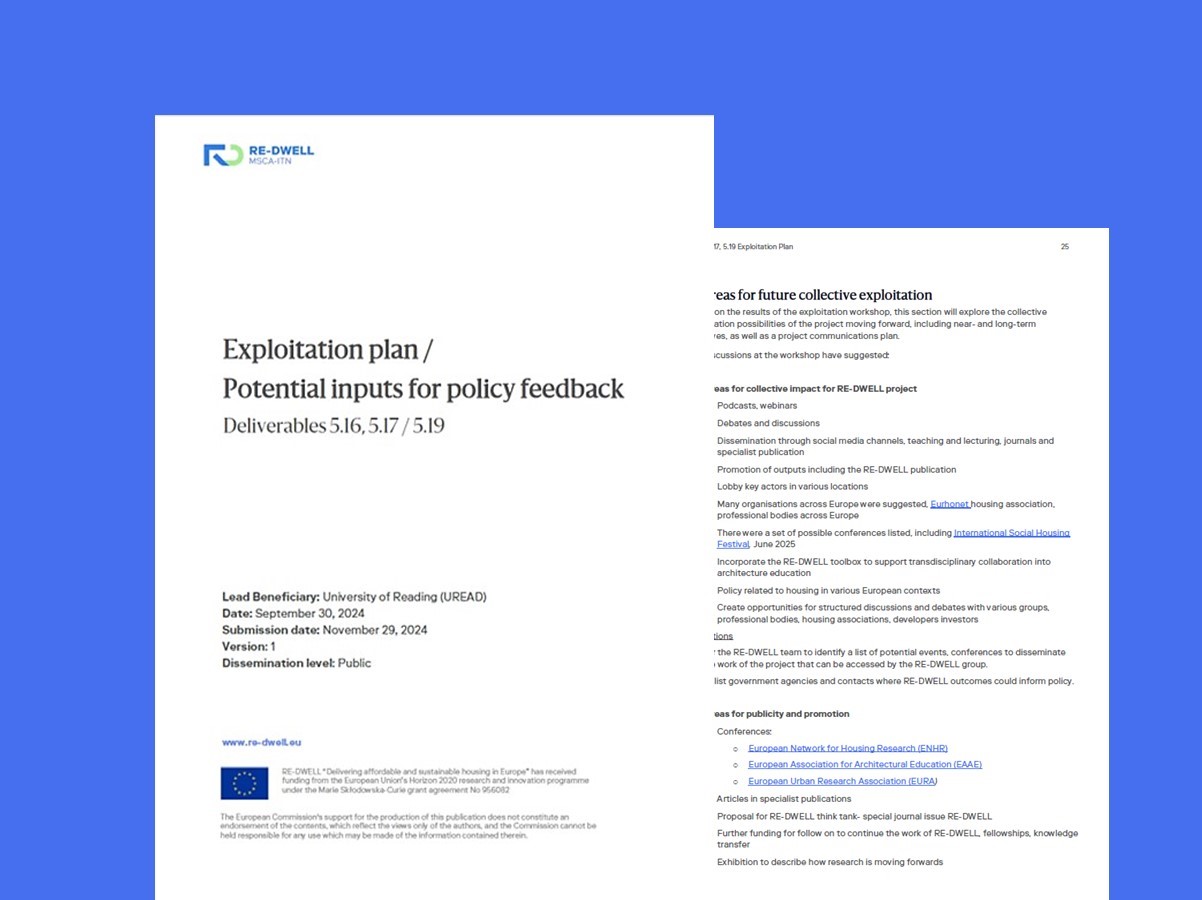
Exploitation plan / Potential inputs for policy feedback
Published on 29-11-2024
This report outlines the work undertaken to identify the outputs generated throughout the project, both at the individual and collective levels. It also examines the dissemination of these outputs and their potential for exploitation by various stakeholders and actors involved in addressing the challenges of affordable and sustainable housing. The work has been conducted in two stages. The first exploitation plan was to provide materials and guideline to disseminate and exploit research findings (Deliverable 5.16). The second report for the exploitation plan was to further consider these materials and guidelines (Deliverable 5.17). The key messages of the project as a whole are further considered in the potential outputs for policy feedback, taking the form of a summary of policy recommendations (Deliverable 5.19).
Read more
->
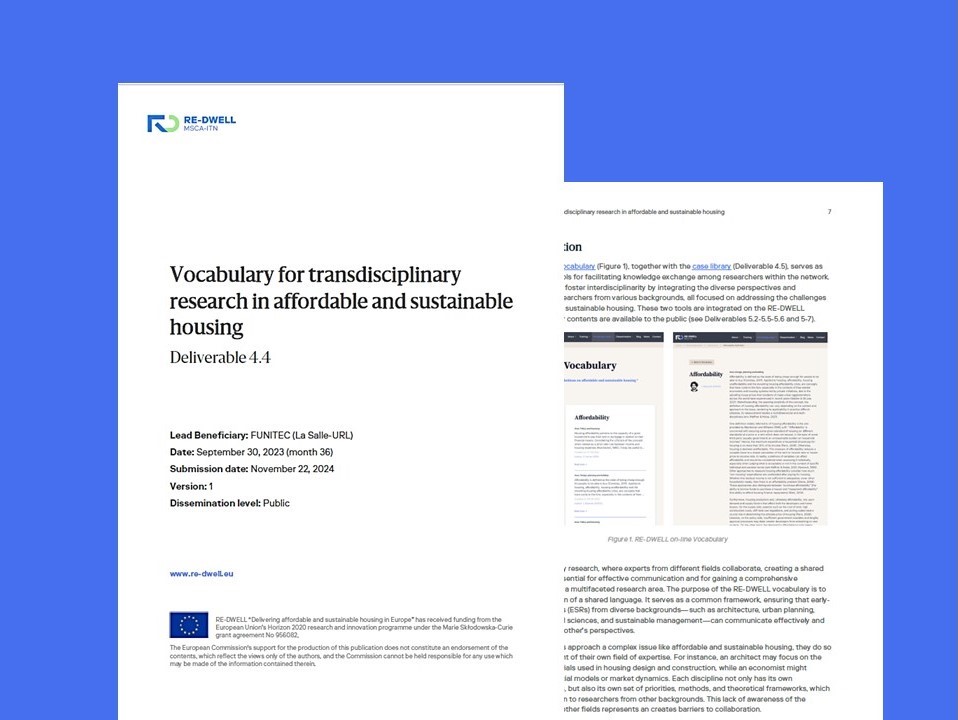
Vocabulary for transdisciplinary research in affordable and sustainable housing
Published on 22-11-2024
The RE-DWELL vocabulary serves two main purposes:
Summarizing research findings: Early Stage Researchers (ESRs) distil their individual research findings into concepts that capture essential ideas related to affordable and sustainable housing.
Sharing concepts: The vocabulary facilitates the sharing of concepts among researchers, highlighting their relevance for the common research and encouraging cross-disciplinary communication.
As a repository of shared knowledge, the RE-DWELL vocabulary fosters a culture of collective learning among network members. Participants can access and engage with materials produced by their peers, broadening their understanding of various topics. It has been used as a learning resource in educational settings during network activities, such as peer reviewing, clustering concepts, and creating concept maps.
A total of 80 vocabulary entries have been created over the three-year project duration by ESRs, either individually or in collaboration with peers and supervisors.
https://www.re-dwell.eu/vocabulary
Read more
->
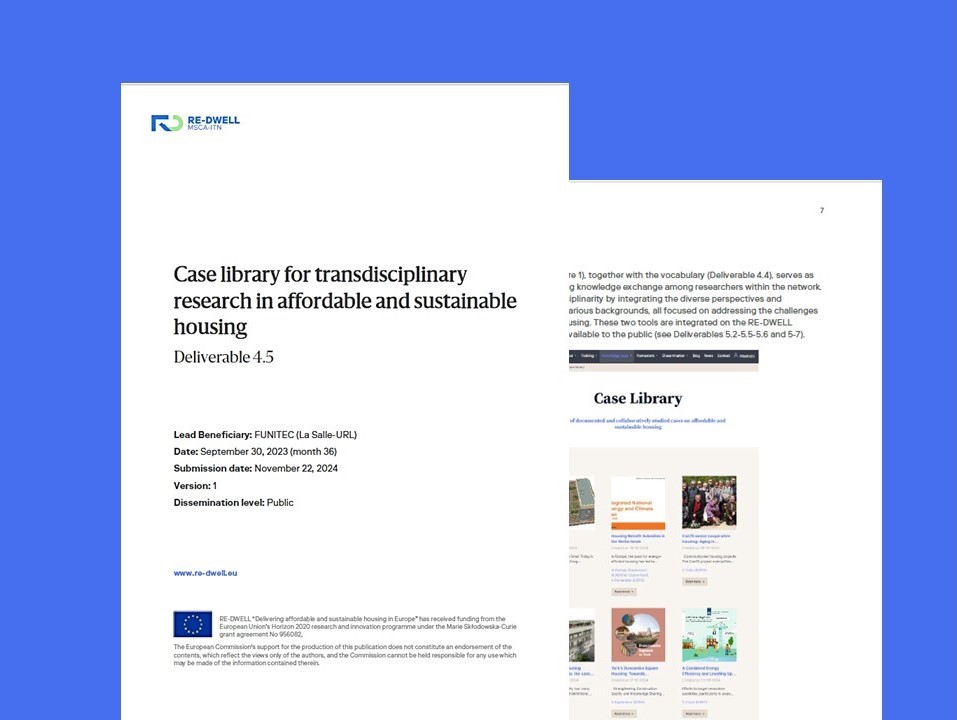
Case library for transdisciplinary research in affordable and sustainable housing
Published on 22-11-2024
The case library is an integral part of the RE-DWELL training programme, helping researchers develop essential skills in desktop research, synthesis, and communication.
A case is organized into sections that include a description, its alignment with RE-DWELL's interconnected research areas—Design, Planning, and Building; Community Participation; and Policy and Financing—as well as its relevance to the Sustainable Development Goals (SDGs). Additional elements include references, related vocabulary, and publications. Each case also features a relational map illustrating links between concepts, cases, and publications, allowing users to explore the website content associatively.
The library includes a total of 43 cases distributed across four categories:
Buildings and designs: 24
Participatory and learning processes: 7
Policy and financing: 11
Urban planning and regulations: 1
https://www.re-dwell.eu/case-library
Read more
->
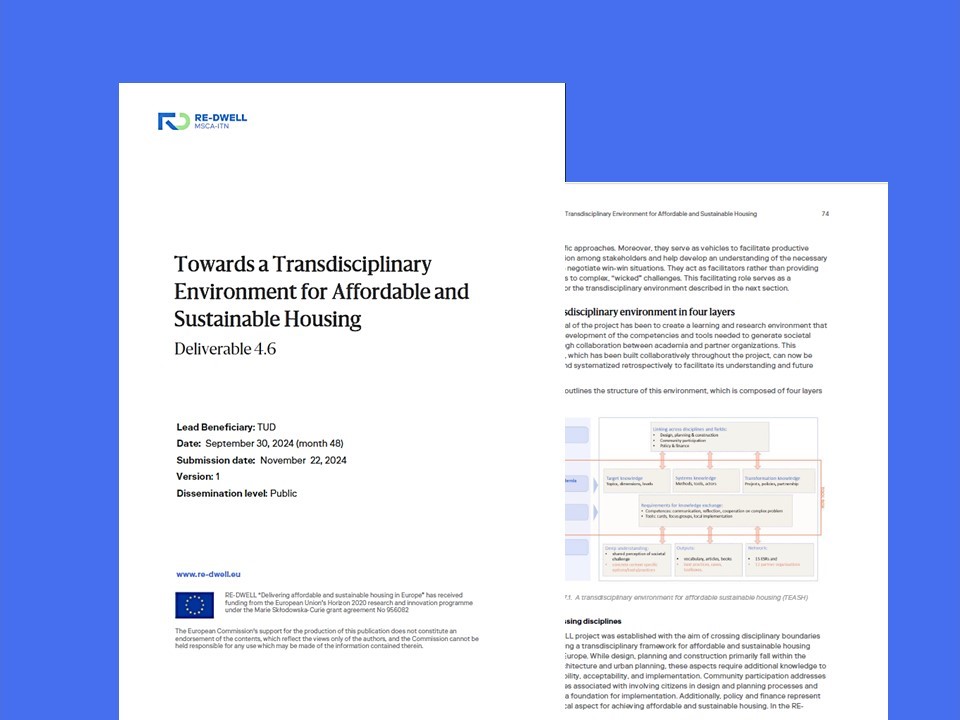
Towards a transdisciplinary environment for affordable and sustainable housing
Published on 22-11-2024
This report presents the Transdisciplinary Environment for Affordable and Sustainable Housing (TEASH) developed in the three-year activity of the RE-DWELL network. Together with Deliverables 4.1-4.5 and 4.7, it represents the work done in the project to create a transdisciplinary learning and research environment spanning over academia, research and practice.
The transdisciplinary learning and research environment built collaboratively throughout the project has been structured and systematized retrospectively to facilitate its understanding and future replication. The Transdisciplinary Environment for Affordable and Sustainable Housing (TEASH) is composed of four layers:
Crossing disciplines, necessary to understand the challenges and trade-offs at stake, to identify strategies across disciplines and fields (see Deliverables 4.1, 4.2 and 4.3)
Linking academia and society, to collaboratively construct knowledge around specific housing problems, based on a tripartite structure: target, systems, and transformation knowledge.
Exchanging knowledge, by means of tools and methods aimed at fostering the collaboration of the diverse stakeholders involved, experts and non-experts
Building impact, creating outputs -white papers, guidelines, policy recommendations, academic publications- that facilitate a better understanding of the specific challenges that the various stakeholder involved are facing.
Read more
->
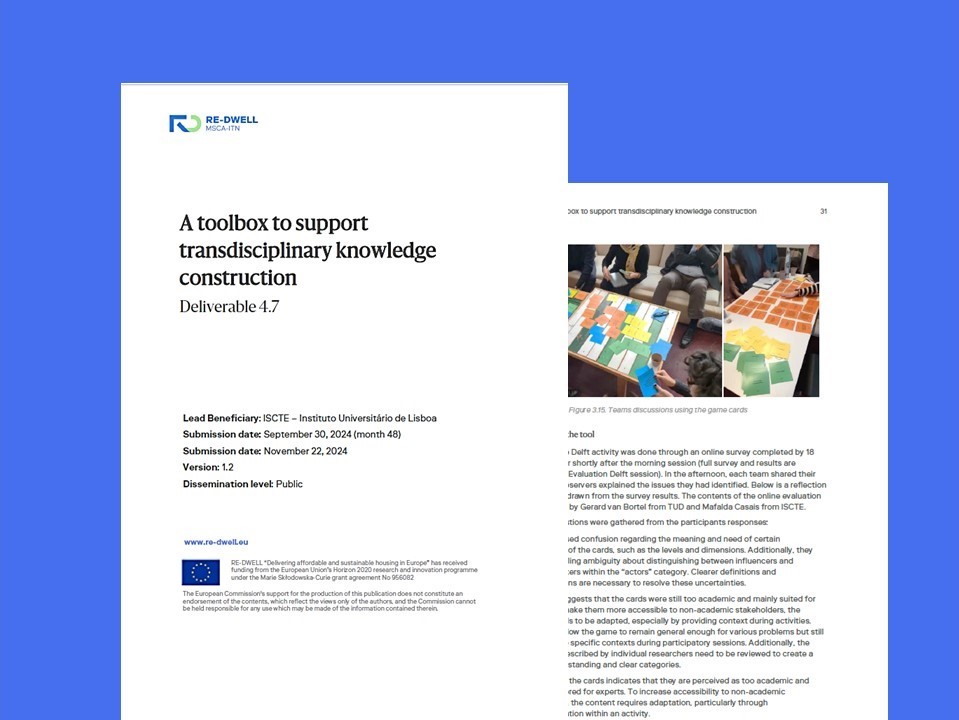
A toolbox to support transdisciplinary knowledge construction
Published on 22-11-2024
The TEASH toolbox was developed to operationalize the principles of transdisciplinarity in addressing the challenge of affordable and sustainable housing. Its objectives were to:
Understand the complexity of the housing challenge.
Integrate diverse perspectives from both academic and non-academic stakeholders on housing problems, goals, and strategies.
Bridge abstract and specific knowledge across academic experts and practice experts.
Foster shared understanding and practices that contribute to solving the societal issue of inadequate housing.
The toolbox was developed through collaborative efforts within the RE-DWELL network, involving ESRs, supervisors, and partner organizations. It was tested in several network activities, including sessions at the International Social Housing Festival in Helsinki (June 2022), the summer school at the University of Reading (July 2023), a network meeting at TU Delft (October 2023), and the final conference in Barcelona (May 2024).
Read more
->
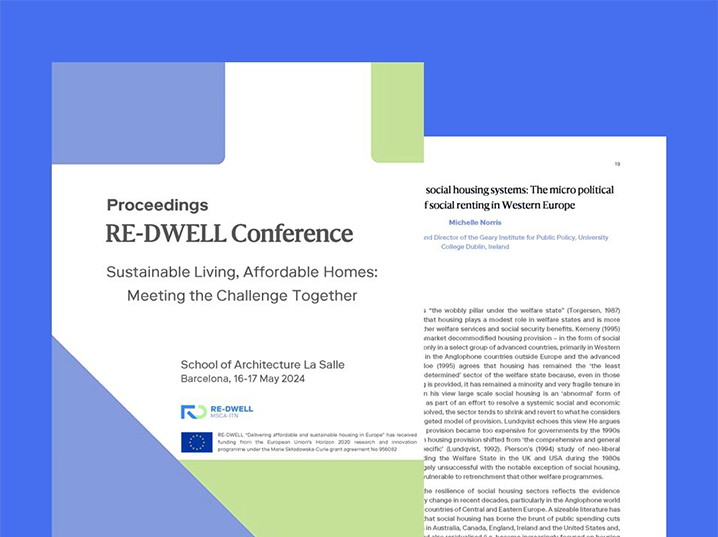
Proceedings Barcelona Conference
Published on 30-09-2024
Proceedings of the RE-DWELL Barcelona conference, held at the School of Architecture La Salle, Barcelona, 16 and 17 May 2024
Read more
->
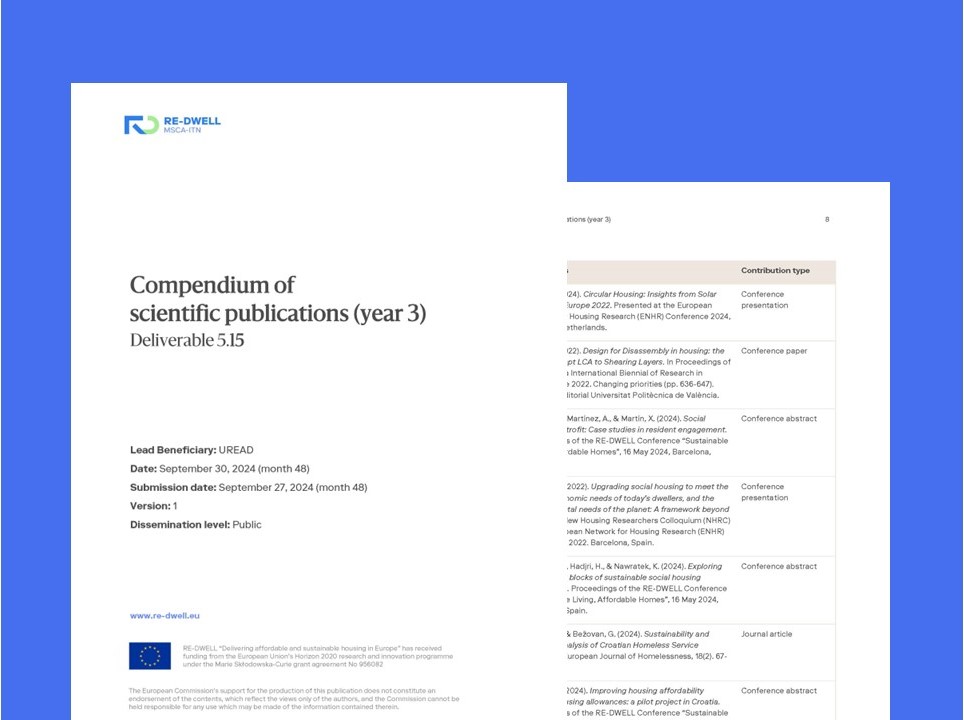
Compendium of scientific publications (year 3)
Published on 27-09-2024
This is a report of the publications made by early-stage researchers between October 2023 and September 2024.
A total of 24 scientific contributions, including conference abstracts, presentations and papers, and journal articles, have been submitted, accepted and/or published during this period. This document contains the list of contributions classified by authors and keywords.
The introductory section includes reflections on the interrelationships between the themes addressed by the publicatoins and the emerging lines of research. In the conclusion, a comparison is drawn with the outcomes of the previous report (year 2), and the relationship with the parallel construction of the RE-DWELL vocabulary is explained.
Read more
->
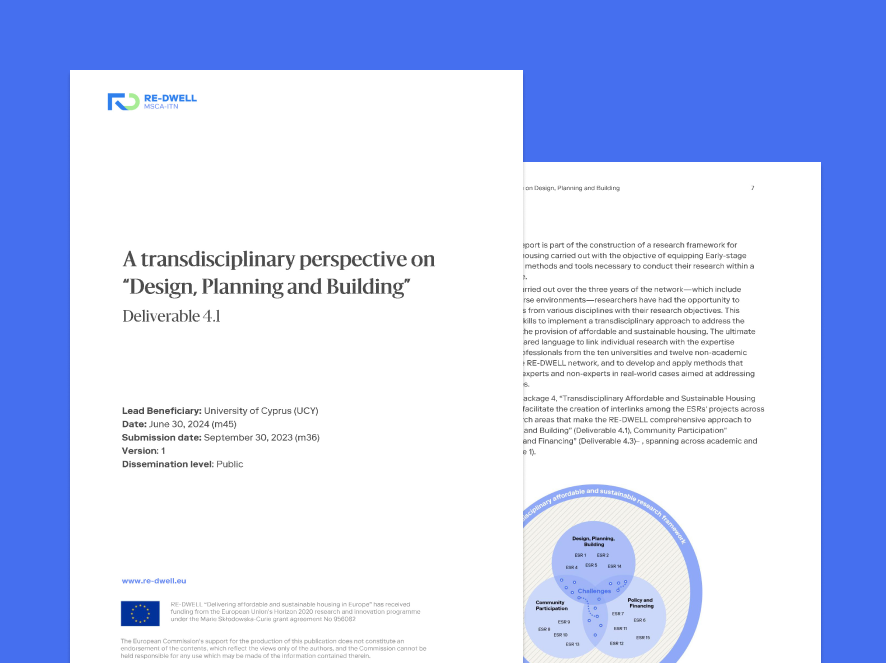
Transdisciplinary research focusing on Design, Planning, Building
Published on 01-07-2024
The work contained in this document has been developed in parallel with the work reported in Deliverables 4.2 and 4.3. To carry out these three lines of inquiry along each of RE-DWELL’s three intertwined research areas – “Design, Planning, Building”, “Community Participation” and “Policy and Financing”–, 14 ESRs have been assigned to one of the three research areas most relevant to their research projects.
The process of the three lines of work has been as follows:
Identifying key issues derived from the work conducted in the ESR research projects
Deriving societal challenges related to the issues identified the research projects
Interlinking challenges across the three research areas
Key themes identified by five research projects focusing on the “Design, Planning, Building” area include the global shortage of sustainable homes and the environmental impacts of construction; the pressing need for sustainable materials and innovative construction techniques to enhance energy efficiency and reduce costs; the importance of ensuring spatial efficiency and inclusive design to cater to diverse demographic needs; the potential of mass customization and participatory methodologies to empower communities and residents; the necessity of simplifying the regulatory framework to facilitate the development of sustainable social housing; the prioritization of health and long-term financial sustainability to ensure the viability and maintenance of housing; the need to address social housing rehabilitation and the promotion of circular, social, and affordable housing.
Read more
->
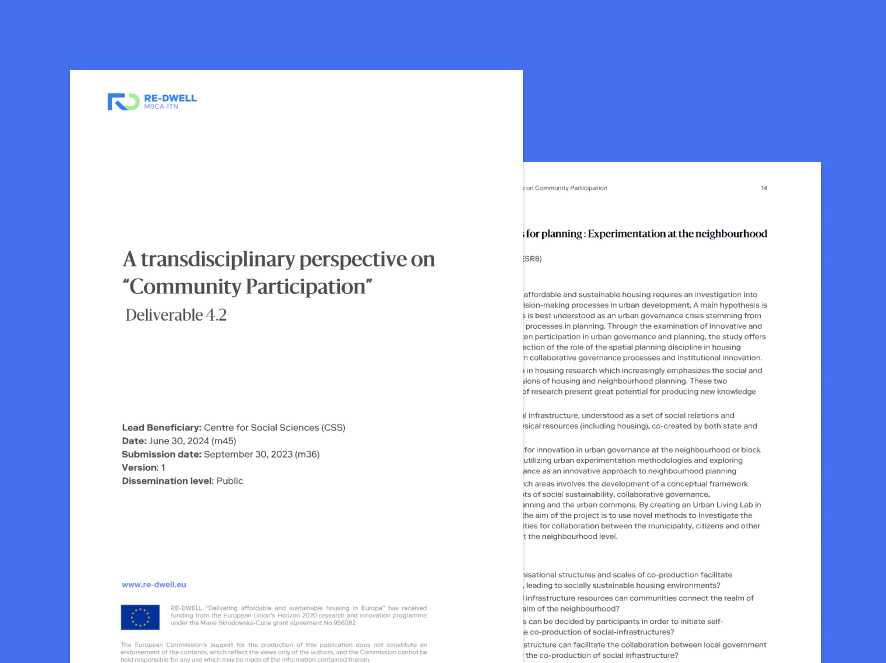
Transdisciplinary research focusing on Community Participation
Published on 01-07-2024
The work contained in this document has been developed in parallel with the work reported in Deliverables 4.1 and 4.3. To carry out these three lines of inquiry along each of RE-DWELL’s three intertwined research areas – “Design, Planning, Building”, “Community Participation” and “Policy and Financing”–, 14 ESRs have been assigned to one of the three research areas most relevant to their research projects.
The process of the three lines of work has been as follows:
Identifying key issues derived from the work conducted in the ESR research projects
Deriving societal challenges related to the issues identified the research projects
Interlinking challenges across the three research areas
Key themes identified by four research projects focusing on the “Community Participation” area include citizen engagement in urban regeneration, particularly community-led planning, to bring together residents under shared goals and to decentralize power from national to local levels; fostering a community-led housing movement to unravel the intricate relationship between architectural outcomes and social dynamics, employing the capabilities approach to analyse factors influencing collaborative housing; promoting innovative collaborative governance for neighbourhood-level urban development, emphasizing citizen engagement; exploiting the potential of urban commons to transform urban governance, emphasizing community engagement, social innovation, and sustainable resource management; and equipping professionals with the necessary skills to foster sustainable community development by implementing a commons-based pedagogical framework for architectural housing studios.
Read more
->
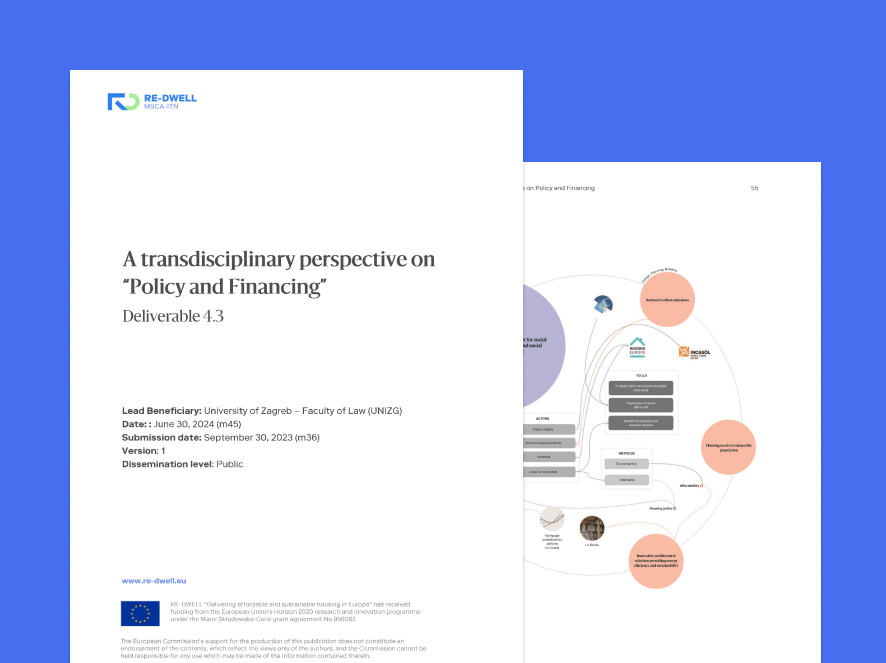
Transdisciplinary research focusing on Policy and Financing
Published on 01-07-2024
The work contained in this document has been developed in parallel with the work reported in Deliverables 4.1 and 4.2. To carry out these three lines of inquiry along each of RE-DWELL’s three intertwined research areas – “Design, Planning, Building”, “Community Participation” and “Policy and Financing”–, 14 ESRs have been assigned to one of the three research areas most relevant to their research projects.
The process of the three lines of work has been as follows:
Identifying key issues derived from the work conducted in the ESR research projects
Deriving societal challenges related to the issues identified the research projects
Interlinking challenges across the three research areas
Five research projects focusing on the area of “Policy and Financing” have identified key themes, including the residualisation of social and public rental housing, particularly in post-socialist countries, worsening housing affordability for vulnerable and middle-income groups; increasing inequality in acquiring housing assets, which exacerbates social class divisions and leaves renters in vulnerable positions with worsening access to decent affordable housing; the need for effective governance strategies to address energy poverty and ensure a just energy transition; tensions in the EU housing markets resulting from the introduction of market finance, which jeopardises social objectives by requiring social housing organisations to operate within market mechanisms; and the need to incorporate post-occupancy evaluation (POE) of social value into policy measures to ensure housing sustainability and improve well-being.
Read more
->
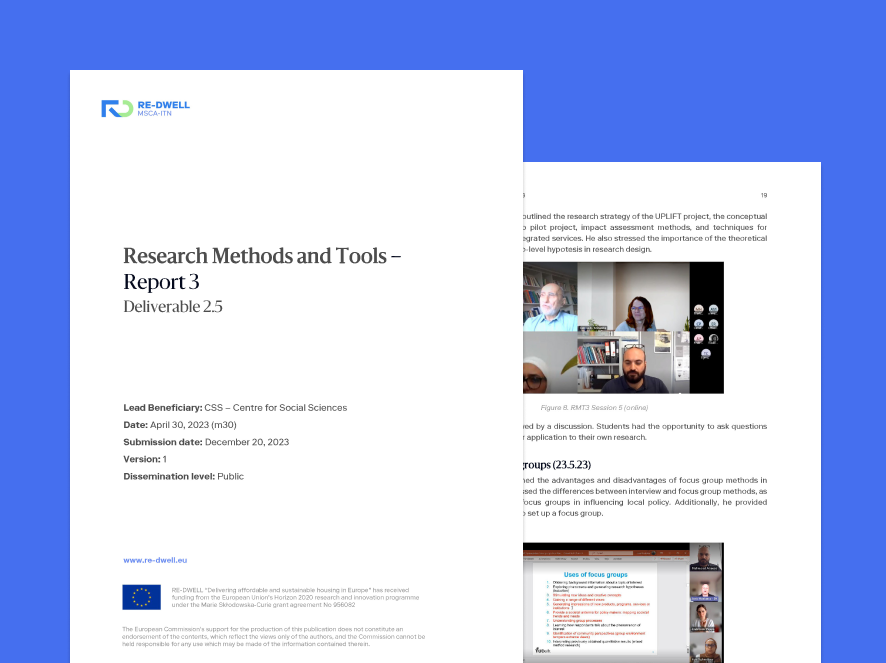
Research Methods and Tools – Report 3
Published on 20-12-2023
This report provides and overview of the content, structure, and outcomes of the Research Methods and Tools course "Transferring research findings to community" (RMT3), conducted from March to October 2023. It ran in parallel with the “Transferable Skills” (TS3) course was aligned with on-going work on WP4 “Transdisciplinary affordable and sustainable housing research framework”. This alignment enhanced collaborative efforts across individual research projects and facilitated transdisciplinary research within the network. The Centre for Social Sciences (CSS) led the planning and delivery of this course, collaborating with other project partners in the design and implementation of learning activities.
Read more
->
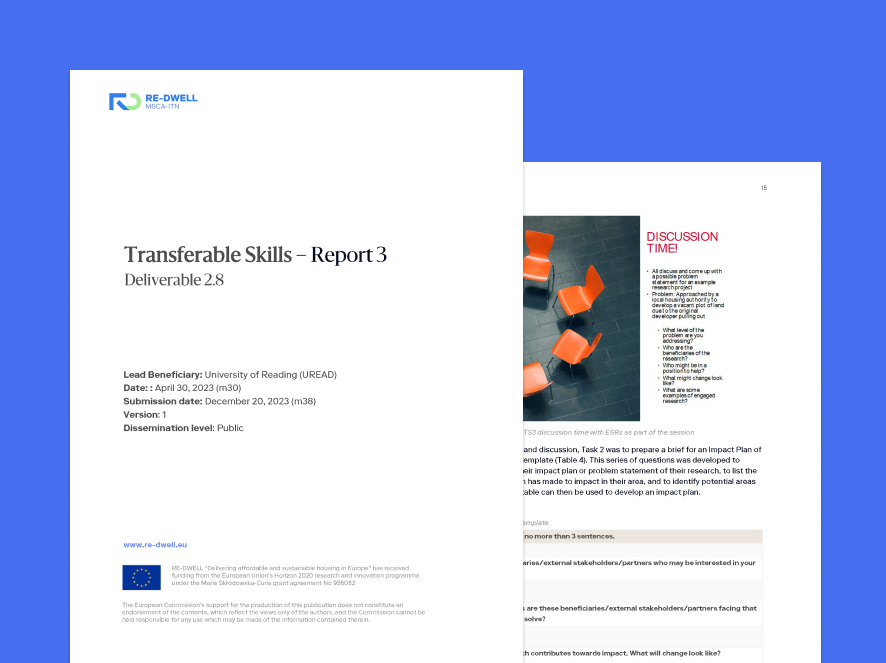
Transferable Skills – Report 3
Published on 20-12-2023
This document describes the content and implementation process of the Transferable Skills 3 course “Communication and dissemination; Engagement and impact” (TS3), conducted from March to October 2023 . It presents the course aims, learning outcomes, structure and content, learning activities, resources, and outputs. The purpose of the course is to provide ESRs with the basic skills to carry out effective communication and dissemination of their research work in different contexts (community, professional, research) and to engage with different stakeholders.
Read more
->
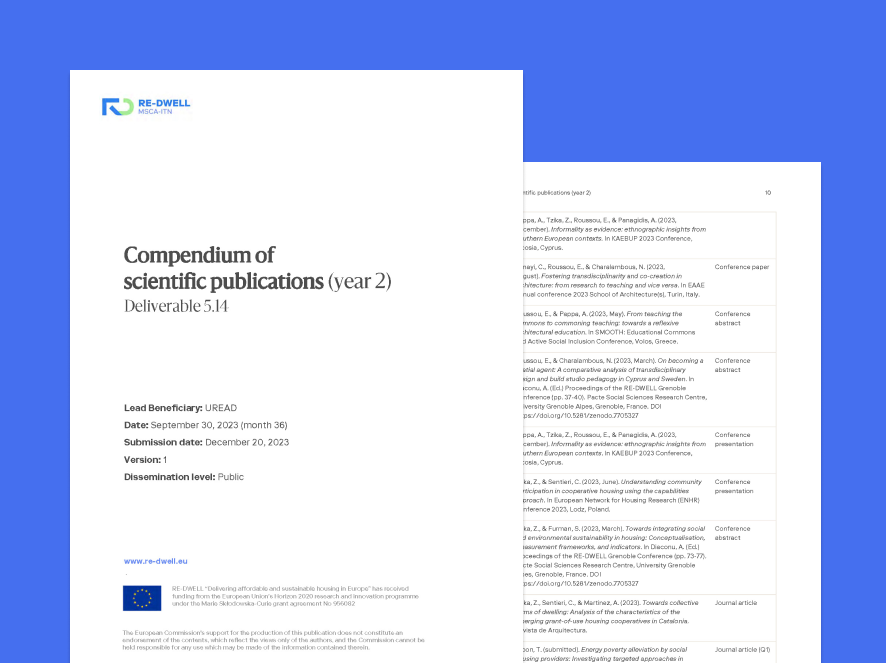
Compendium of scientific publications (year 2)
Published on 12-12-2023
This is a report of the publications made by early-stage researchers between October 2022 and September 2023.
A total of 31 scientific contributions, including conference abstracts, presentations and papers, and journal articles, have been submitted, accepted and/or published during this period. This document contains the list of contributions classified by authors and keywords.
The introductory section includes reflections on the interrelationships between the themes addressed by the publicatoins and the emerging lines of research. In the conclusion, a comparison is drawn with the outcomes of the previous report (year 1), and the relationship with the parallel construction of the RE-DWELL vocabulary is explained.
Read more
->
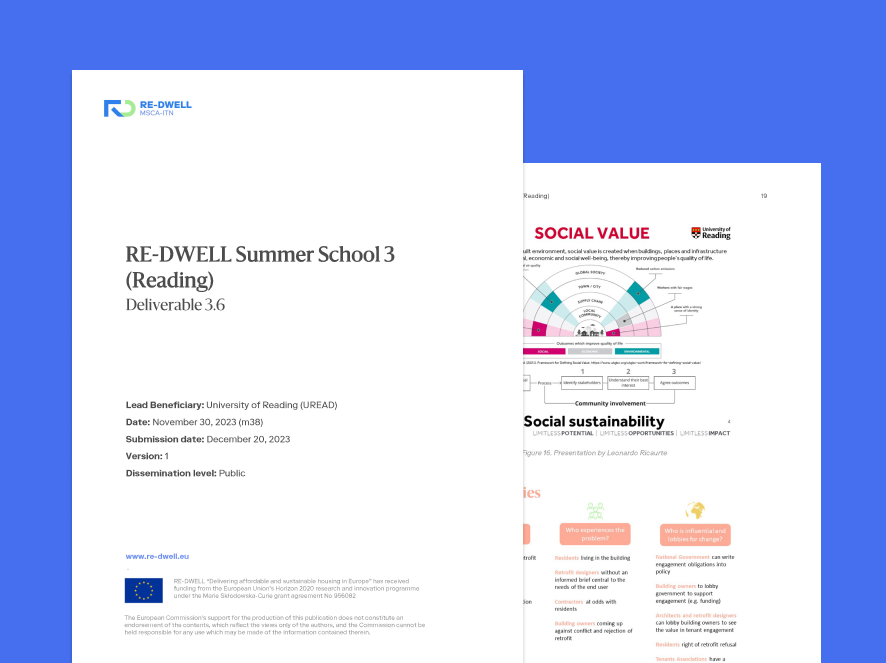
Summer School 3 (Reading)
Published on 12-12-2023
The theme of the Reading summer school, “Innovations in Affordable and Sustainable Housing,” was addressed from multiple perspectives through presentations from invited speakers from professional practice, and academia.
The programme included workshops to support the development of ESR’s research through training activities related to two ongoing structured courses: RMT3 “Transferring research findings to community stakeholders” and TS3 “Communication and dissemination; Engagement and impact”. Following the blended-learning approach the activities of the courses began online, to be continued in-person during the event.
In addition to the activities at the University of Reading, there were lectures held in London at the premises of Clarion Housing Association, a partner organisation, and at Pollard Thomas Edwards architectural office, a firm conducting research on affordable housing. Additionally, there was a site visit to a new "build-to-rent" housing development in Reading town centre.
The summer school programme placed particular emphasis on sessions related to WP4, "Transdisciplinary Affordable and Sustainable Housing Research Framework." The goal of work in this package is to integrate the research projects of ESRs within a transdisciplinary framework, which is being developed bottom-up and top-down. A serious game session facilitated discussions on the foundation of this framework, laying the groundwork for its further development. Additionally, participants discussed a shared strategy for collecting inputs from ESRs' projects to create a cohesive set of reports.
Read more
->
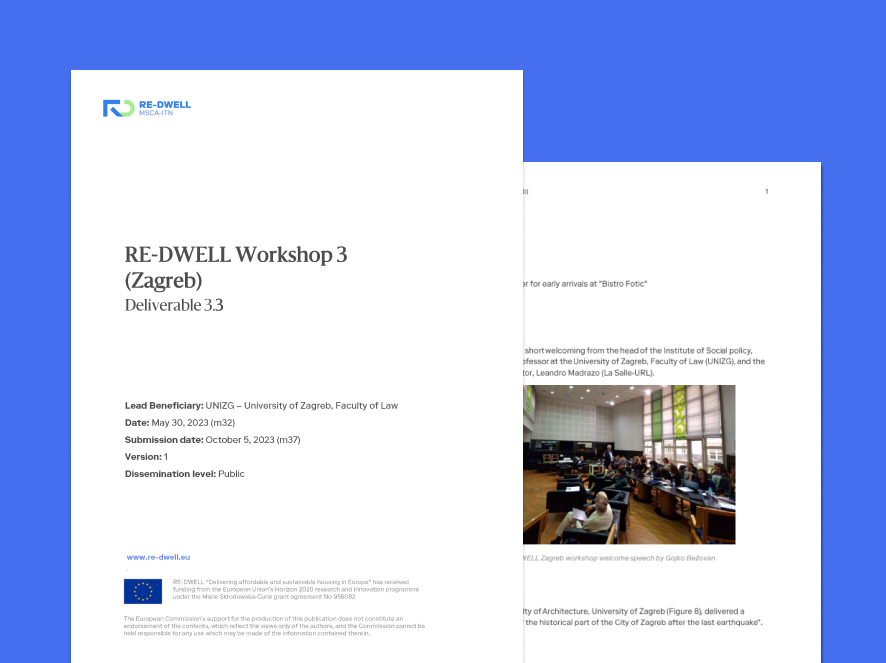
Workshop 3 (Zagreb)
Published on 05-10-2023
The third and final workshop, organised by the University of Zagreb, Faculty of Law, Institute for Social Policy (UNIZG) was carried out during the third year of the project activities in Zagreb, from March 29 to 31, 2023.
The theme of the Zagreb workshop, “Policy and financing for affordable and sustainable housing”, was approached from a transdisciplinary perspective, focusing on urban renewal, social and rental housing, and social mix. The workshop programme fulfilled various objectives: to follow up on the development of the ESRs’ research by fostering networking between the individual research projects, to conduct training activities related to two structured courses (RMT3 and TS3), to continue with the collaborative research work (vocabulary and case studies library) and to engage local stakeholders in the networking actions (non-academic sectors, local administrations and civic organizations concerned with sustainable and affordable housing). Furthermore, activities focusing on production of transdisciplinary affordable and sustainable housing research framework took place, as laid down in WP4.
Two guest speakers, members of the RE-DWELL External Advisory Board, participated in the workshop. Montserrat Pareja-Eastaway from the University of Barcelona, gave a talk on the topic “Beyond the market: transforming the housing agenda in Europe”, and Ana Vaz Milheiro, from the ISCTE-Universty Institute of Lisbon, on “Portuguese residential strategies before the Carnation Revolution: designing affordable neighbourhoods”
Read more
->
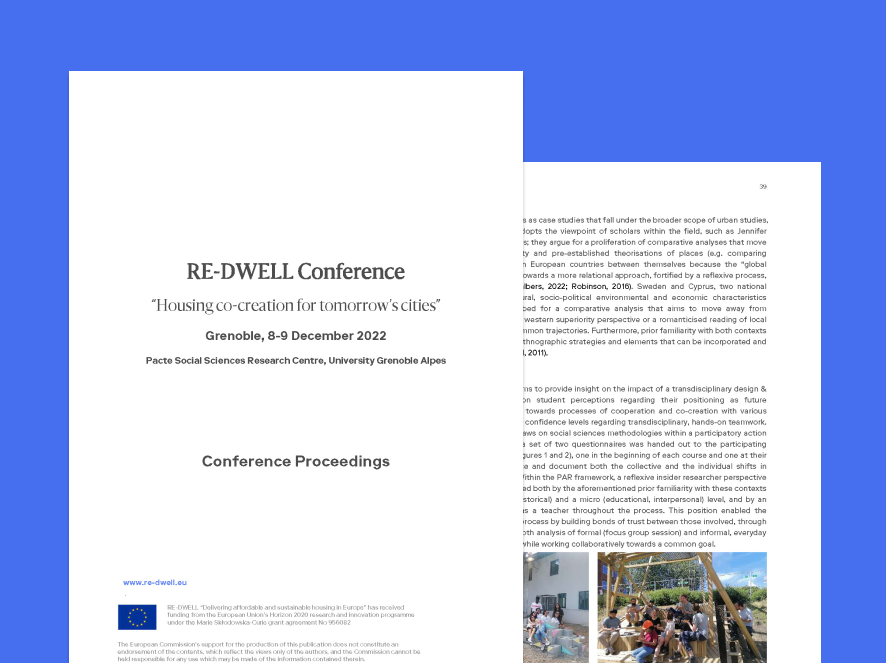
Proceedings Grenoble Conference
Published on 10-03-2023
Proceedings of the RE-DWELL Grenoble conference, held at the Université Grenoble Alpes, 8 and 9 December 2022
DOI 10.5281/zenodo.7705327
Read more
->
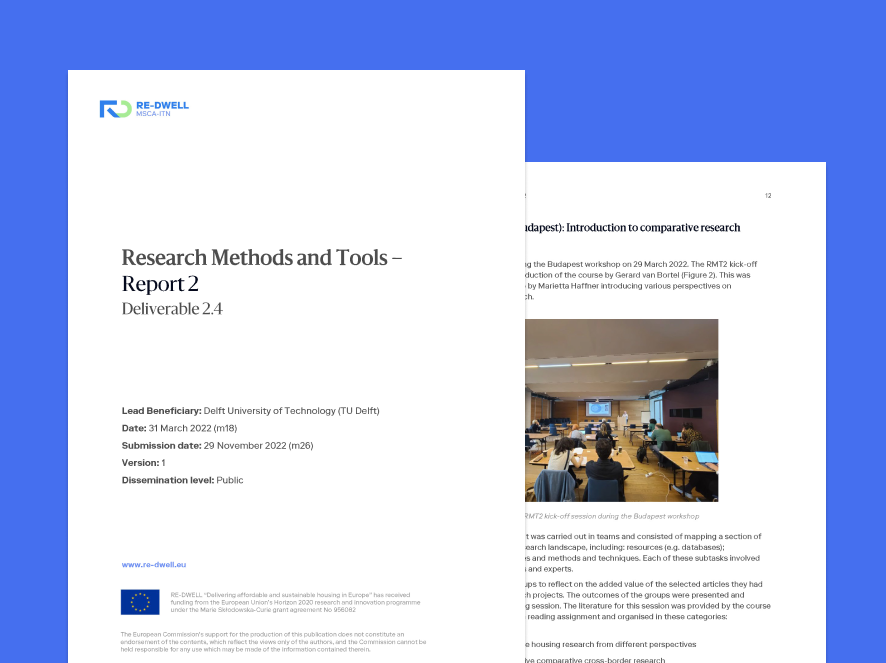
Research Methods and Tools – Report 2
Published on 29-11-2022
The purpose of this report is to document the objectives, content and implementation process of the Research Methods and Tools 2 (RMT2) course. The course is worth 4 ECTS, which is equivalent to about 100 hours of learning, including online and in-person sessions and self-directed work.
RMT2 aimed to encourage ESRs to critically engage with comparative research methodologies and tools, integrating them into their research projects where appropriate. Also reflecting on the transferability of research findings and recommendations was part of the course content.
Two results of the course, an overview of qualitative and quantitative data resources and reflective essays on comparative research methodologies and tools, can be further developed. The data resources will be included as resources in the project website, and the essays are valuable research outcomes which can be further developed.
Read more
->
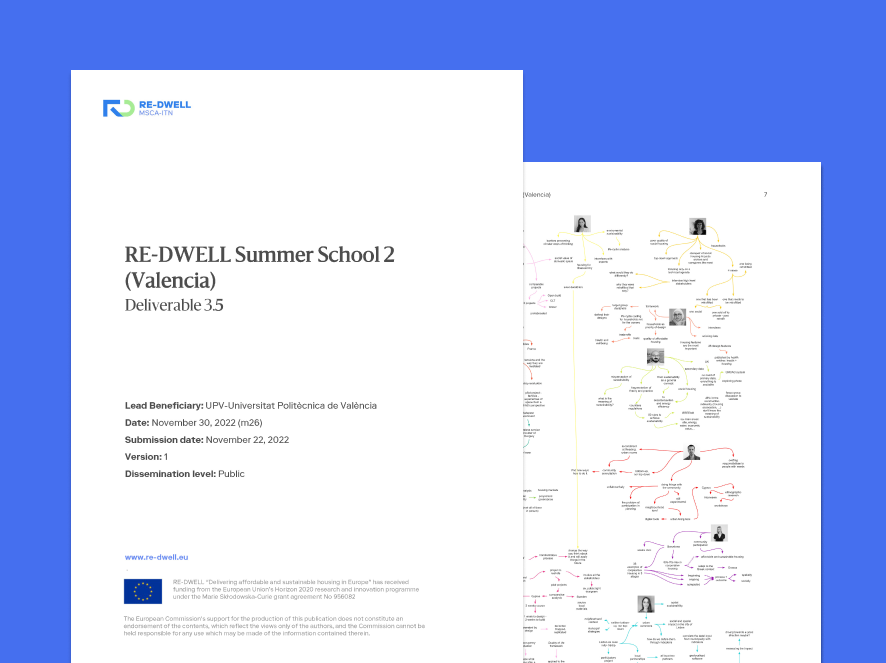
Summer School 2 (Valencia)
Published on 22-11-2022
The second RE-DWELL Summer School was held at the Universitat Politècnica de València, from 11 to 15 July 2022. The programme of activities aimed at fostering the exchange of knowledge across early-stage researchers (ESRs), supervisors and non-academic organisations, on the challenges and opportunities in Inclusive co-design and community planning of affordable and sustainable housing.
The theme of the summer school, “Inclusive co-design and community planning of affordable and sustainable housing”, was thus addressed from multiple perspectives including invited speakers from professional practice and academia, local administrations and a local partner organisation. The presentations were followed by insightful group discussions and complemented by site visits to the eco-neighbourhood La Pinada , and to two examples of residential housing built by cooperatives: Santa María Micaela, from the 1960s, and Espai Verd, completed in the early 1990s.
The series of open roundtables that started with the Lisbon workshop in September 2021, has continued with a fourth roundtable dedicated to address the question “How can community participation in the provision of affordable and sustainable housing be guided?”.
Read more
->
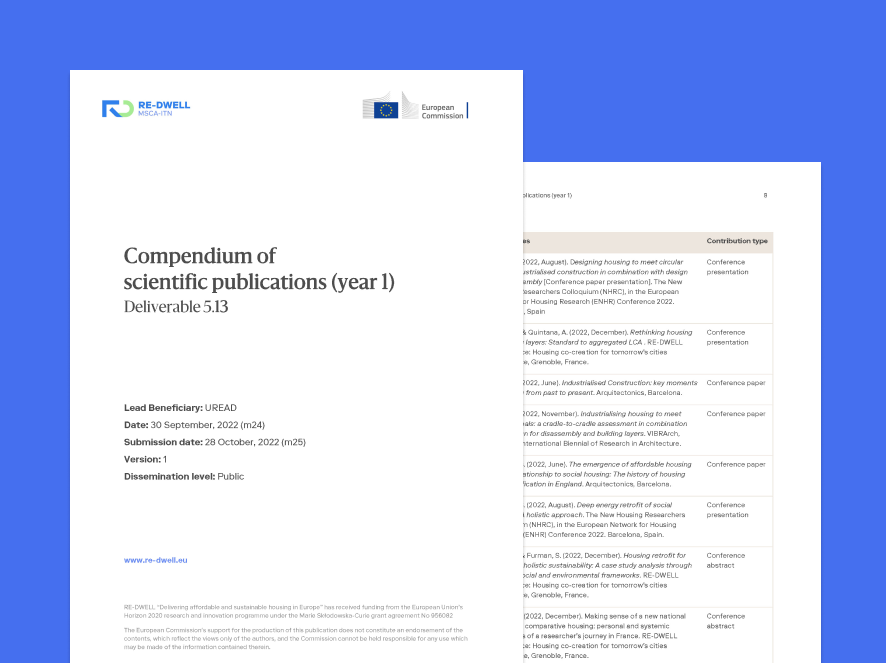
Compendium of scientific publications (year 1)
Published on 28-10-2022
This is a report of the publications made by early-stage researchers from June 2021 to September 2022.
A total of 34 conference contributions ‒ including abstracts, papers and posters ‒ have been submitted, accepted and/or presented during this period. This document contains the list of contributions, classified by authors and keywords. The abstracts are included in the annex and published on the project website.
The document includes some reflections on the interrelationships between the lines of research emerging from the publications, as well as some suggestions for further research in the next two years of network activity.
Read more
->
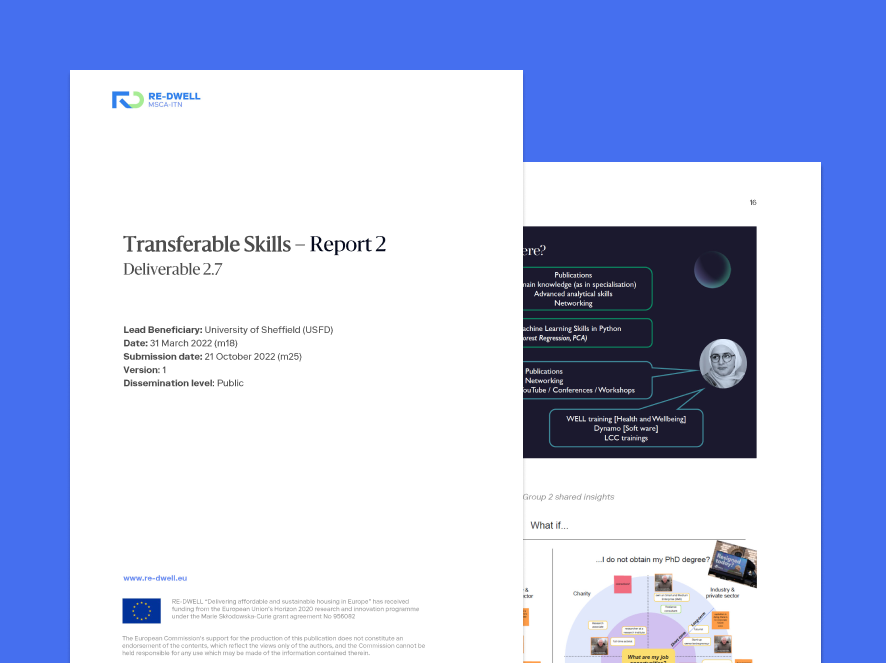
Transferable Skills - Report 2
Published on 24-10-2022
This document describes the content and implementation process of the Transferable Skills 2 (TS2) course. It presents the course aims, learning outcomes, structure and content, learning activities, resources, as well the outputs of the course. TS2 is focused on entrepreneurship, and professional and career development. Transferable skills covered under TS2 include eight topics divided into two sub-groups: (a) Entrepreneurship/Enterprise; and (b) Professional and career development. TS2 is a 4-ECTS course, which equates to approximately 100 hours of learning, including online and in-person sessions and self-directed work. TS2 has also two group work tasks.
Read more
->
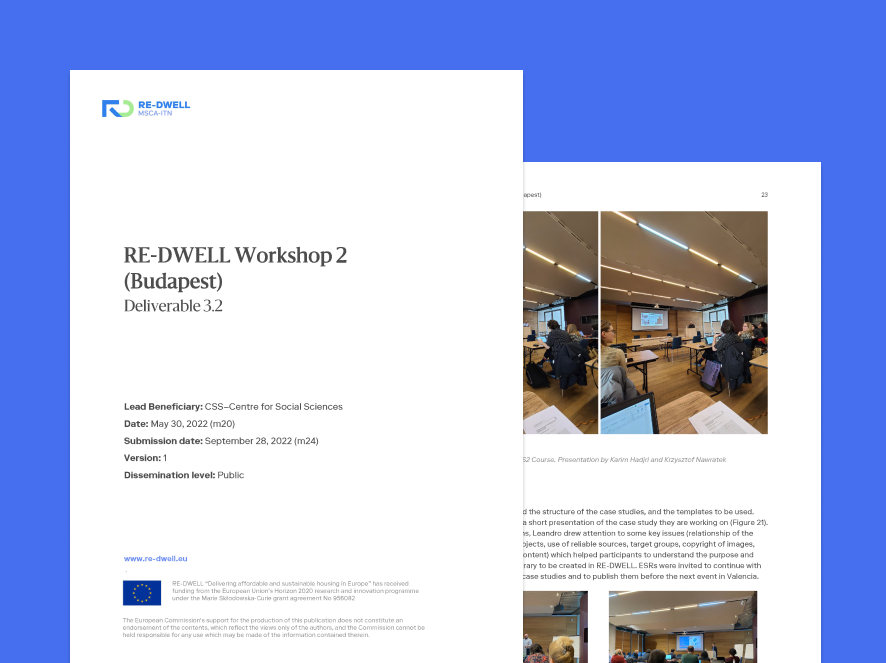
Workshop 2 (Budapest)
Published on 29-09-2022
The workshop organized by the Centre for Social Sciences (CSS) has been carried out during the second year of the project activities in Budapest, from March 28 to 30, 2022.
The theme of the workshop, "Community Involvement in Affordable and Sustainable Housing," was approached from a sociological perspective, focusing on socio-spatial inequalities, financialization and housing, and green homes and communities.
The workshop programme fulfilled various objectives: to follow up on the development of the ESRs’ research by fostering networking between the individual research projects, to conduct training activities related to two structured courses (RMT2 and TS2), to continue with the collaborative research work (vocabulary and case studies library) and to engage local stakeholders in the networking actions (non-academic sectors, local administrations and civic organizations concerned with sustainable and affordable housing).
An open roundtable was held on the topic of "Community Engagement", with the online participation of Prof. Jenny Pickerill and Prof. Richard Lang, and moderated on-site by Prof. Gerard van Bortel.
Local NGOs and secondment representatives were involved in the organization and implementation of some workshop activities, including:
- Projection and discussion of the documentary “No Country for the Poor”, with the participation of two members of the organisation AVM, A Város Mindenkié (The City for All).
- Urban rehabilitation in District VIII, lectures and site visit organized by the local Urban Rehabilitation and Development Company (RÉV8) and the partner organisation MRI.
- A serious game facilitated by the local NGO CoHousing Budapest Association.
Read more
->
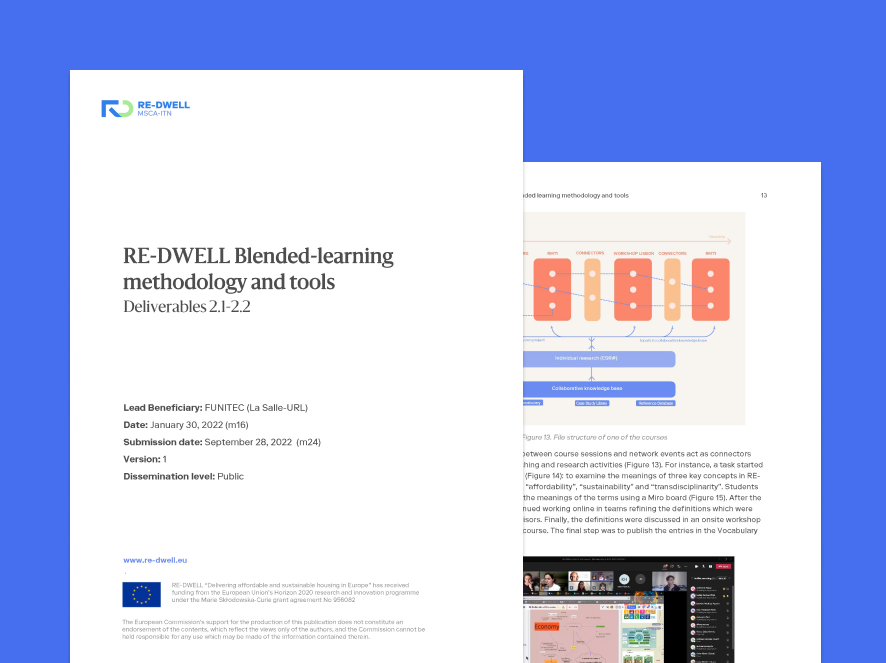
Blended-learning methodology and tools
Published on 29-09-2022
This report summarises the work carried out in Task 2.1 "Online learning platform", dedicated to the creation of a blended learning environment to implement a programme of online and face-to-face activities.
During the first year of the project, the beneficiaries examined various technological solutions to support the online learning and teamwork activities, including open software, proprietary platforms facilitated by third parties, and platforms developed by the participating institutions.
In addition, and to facilitate networking between individual research projects and the building of a shared knowledge base, a glossary and a case study library, both of which are available on the project website, have been specifically created to support collaborative research.
A blended-learning methodology using the selected technologies which were applied in the training and network activities, was progressively introduced as the programme developed. Thus, the courses have been planned and implemented to be delivered as a combination of online and face-to-face sessions that take place in the workshops and summer schools.
Finally, a table of learning outcomes tailored to RE-DWELL’s training and research activities is included in the Annex.
Read more
->
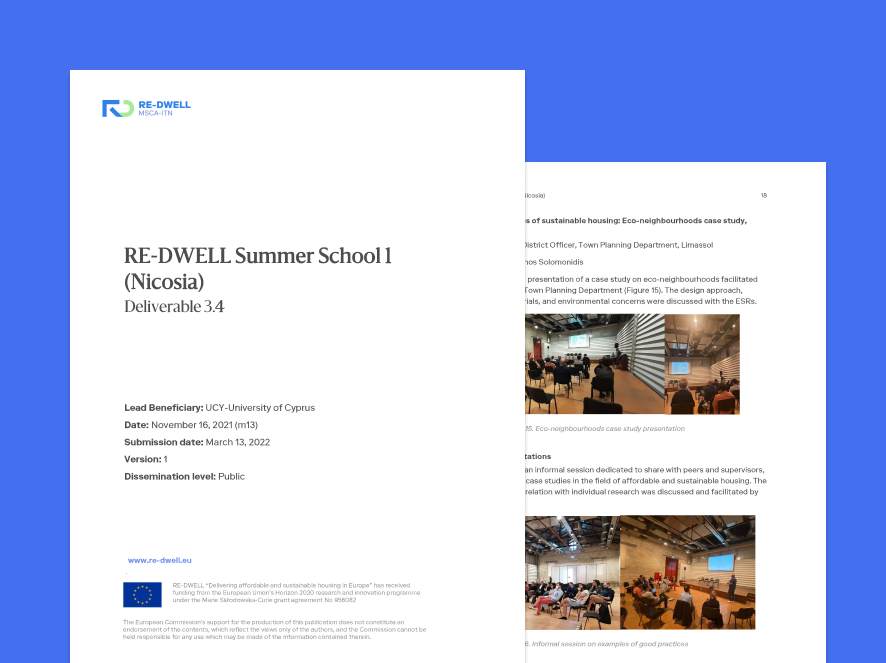
Summer School 1 (Nicosia)
Published on 13-03-2022
The first of the three planned summer schools, organized by the University of Cyprus (UCY), was carried out in Nicosia, from November 15 to 20, 2021. This report focuses on the results of this summer school.
The theme of the summer school, “Planning, Design and Retrofitting of Affordable and Sustainable Housing”, was thus addressed from multiple perspectives through presentations from invited speakers from professional practice, academia, the local partner organisation and the local municipalities.
The programme of activities enabled a follow-up on the development of ESR’s research through training activities related to the ongoing structured courses (two sessions on “Research, Methods and Tools 1” and “Transferrable Skills 1”). The presentations were followed by insightful group discussions and were complemented by site visits to the Nicosia Master Plan’s regeneration projects (north and south Nicosia) and the local partner organisation’s (CLDC, Cyprus Land Development Corporation) housing projects in the city of Limassol.
A roundtable to discuss “The design of affordable and sustainable housing: challenges and opportunities” was open to the public via an online session.
Read more
->
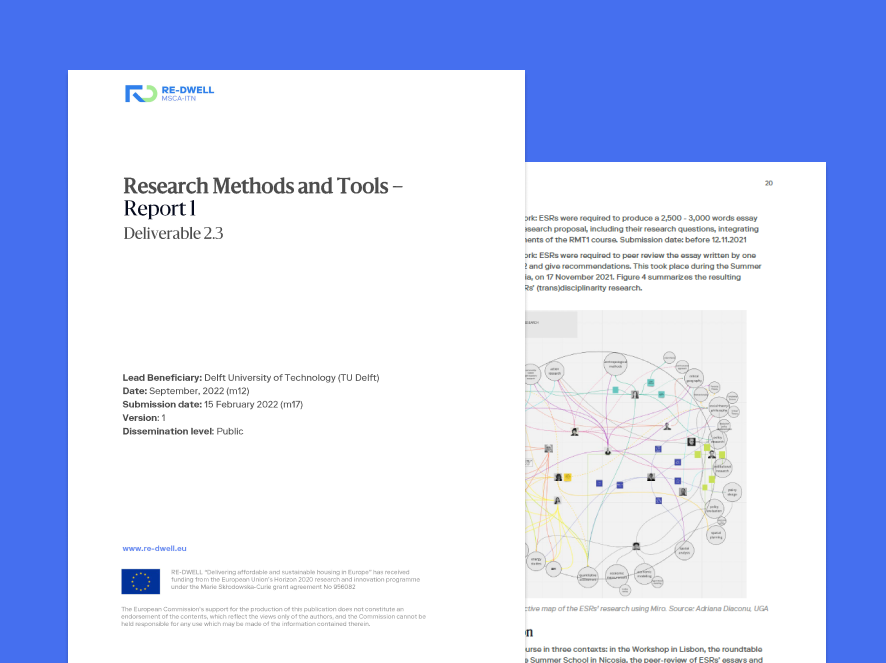
Research Methods and Tools – Report 1
Published on 21-02-2022
The purpose of this report is to document the objectives, content and implementation process of the Research Methods and Tools 1 (RMT1) course. The course is worth 4 ECTS, which is equivalent to about 100 hours of learning, including online and in-person sessions and self-directed work. As indicated in the RE-DWELL research proposal, RMT1 introduced the main concepts of the RE-DWELL research structure: sustainability, affordability, and transdisciplinarity. Moreover, the course aimed to stimulate ESRs to critically engage with these concepts by integrating them in their research projects.
Read more
->
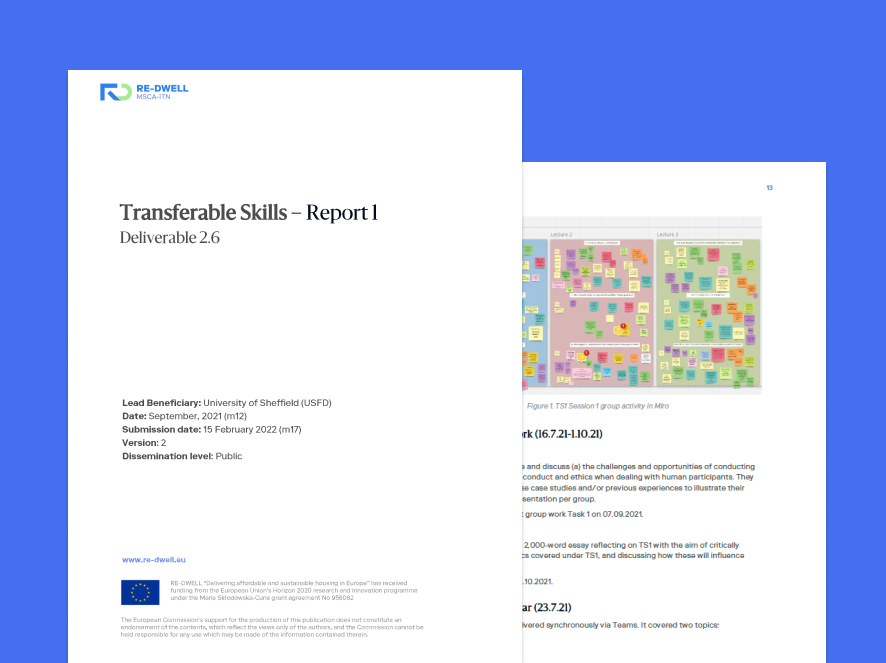
Transferable Skills – Report 1
Published on 21-02-2022
This document describes the content and implementation process of the Transferable Skills 1 (TS1) course. It presents the course aims, learning outcomes, structure and content, learning activities, resources, and outputs. This course is focused on personal qualities and self-management, ethics, open science and Intellectual Property Rights (IPR). Transferable skills covered under TS1 include five topics contained in two sub-groups: (a) Personal qualities and self-management; and (b) Ethics, open science and IPR. TS1 is a 4-ECTS course, which equates to approximately 100 hours of learning, including online and in-person sessions and self-directed work.
Read more
->
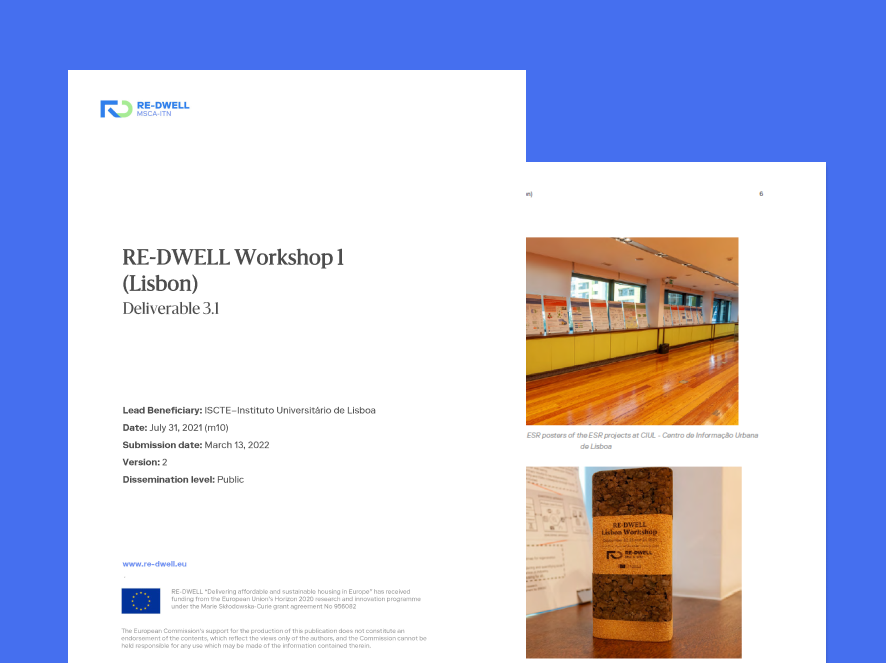
Workshop 1 (Lisbon)
Published on 09-11-2021
This is a report of the RE-DWELL Workshop 1 that took place in Lisbon, 22, 23 and 24 of September, 2021, hosted by ISCTE-IUL.
The programme was structured to fulfil various objectives: to follow-up the development of the ESRs’ research by fostering networking between the individual research projects, to conduct training activities related to ongoing structured courses (RMT1 and TS1), and to engage external stakeholders in the network actions. The workshop activities included lectures by representatives of the Lisbon Municipality, CASAIS engineers, external invited guests and professors from ISCTE-IUL specialized in participation, sustainability and housing policies, as well as guided visits to the BIP/ZIP neighbourhoods and to a CASAIS building site.
The programme included a roundtable on the topic "Transdisclipinary Research for Affordable and Sustainable Housing" moderated by Prof. Flora Samuel, University of Reading. The guest speakers were:
David Clapham, Professor of Housing and Urban Studies, University of Glasgow
Gilles Debizet, Professor in Urban Planning, University Grenoble Alpes
Doina Petrescu, Professor of Architecture and Design Activism, University of Sheffield,
Read more
->
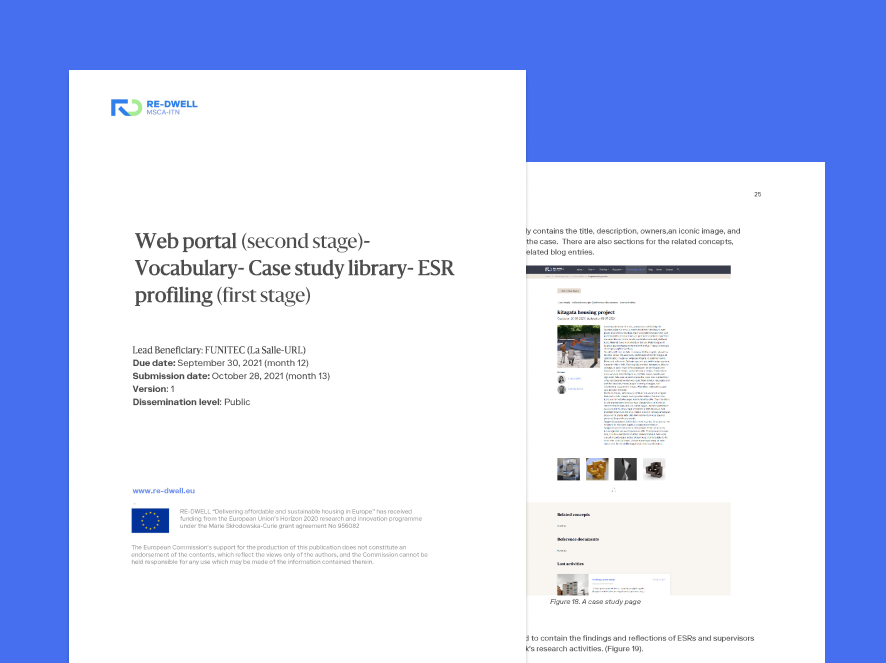
Web portal (second stage)-Vocabulary-Case study library-ESR profiling (first stage)
Published on 02-11-2021
This report contains the work corresponding to four deliverables:
•Deliverable 5.2 Web portal (second stage), follow-up of Deliverable 5.1 “Web portal (first stage)”
•Deliverable 5.5 Vocabulary, online glossary of the networks’ research
•Deliverable 5.6 Case study library, online collection of documented references
•Deliverable 5.7 ESR profiling (first stage), continuous reporting of the work done by ESRs
The four deliverables refer to components of the project website that are interrelated. To facilitate the understanding of these interrelationships, the four deliverables are presented in a single document.
Read more
->



























